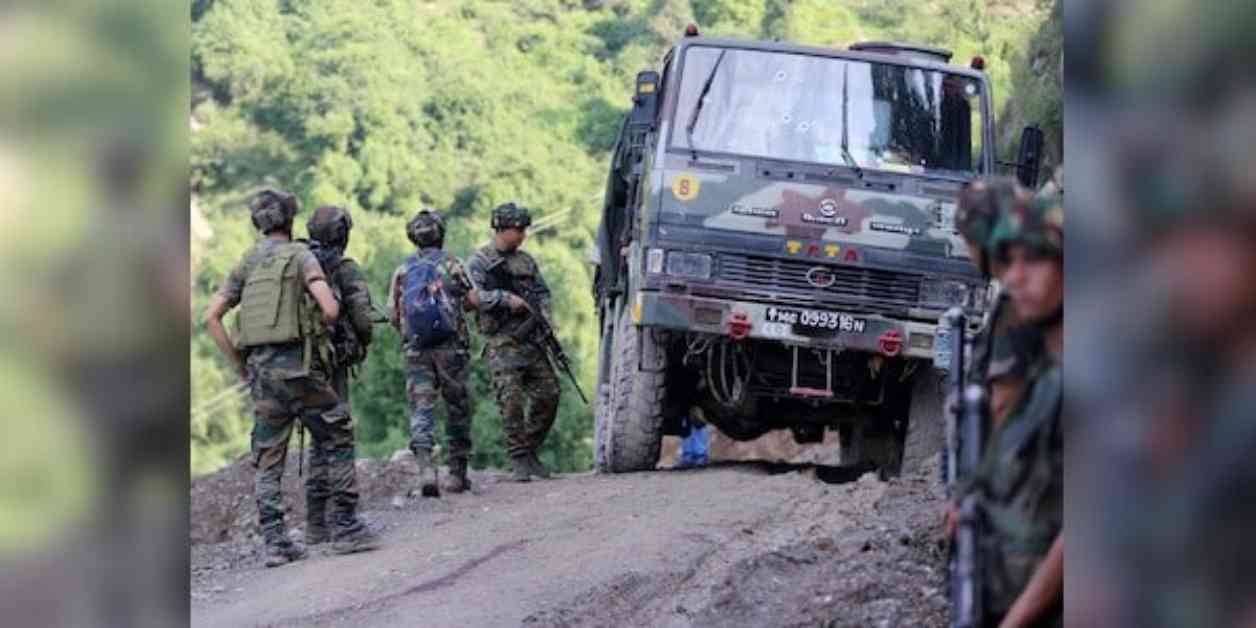Security forces in Jammu and Kashmir made a significant breakthrough recently when they uncovered an underground terrorist hideout in the Rajouri district. The operation, which was carried out by a joint party of police, Army, and CRPF, resulted in the discovery of a well-built hideout that had been carefully camouflaged with soil.
According to a police spokesman, the hideout contained a large quantity of daily use items and some ammunition. Among the items recovered were four cooking gas cylinders, six empty AK rifle magazines, one pistol magazine with 13 bullets, one INSAS rifle magazine with 19 rounds, one communication set, one solar light with plate, one pair of hand gloves, and wheat flour. The hideout also contained dry fruits, cookers, pencil cells, blankets, bags, water cans, power banks, data cables, adaptors, shoes, wire cutters, screwdrivers, tiffins, body warmer sets, hand grips, torches, washing powder, milk powder packets, and other eatables.
Despite the significant haul, no arrests were made during the operation as the terrorists who had been using the hideout managed to escape before security forces could apprehend them. This discovery highlights the ongoing threat of terrorism in the region and the challenges faced by security forces in combating it.
In addition to the hideout in Rajouri, security forces also uncovered a cave-type hideout in the Balotha area of Basantgarh in Udhampur district. While some food items were recovered from the abandoned hideout, no terrorists were found in the vicinity. The search operation in Basantgarh was intensified following an attack on a joint patrol party of CRPF and police, during which an inspector-rank officer of the paramilitary force was killed.
The discoveries in Rajouri and Udhampur underscore the persistent threat of terrorism in Jammu and Kashmir and the ongoing efforts of security forces to root out terrorist activities in the region.
Challenges Faced by Security Forces
The uncovering of underground hideouts in Rajouri and Udhampur highlights the challenges faced by security forces in Jammu and Kashmir. The rugged terrain, dense forests, and porous borders make it difficult to track and apprehend terrorists operating in the region. Terrorists often take advantage of the difficult terrain to hide in underground bunkers and caves, making it challenging for security forces to locate and neutralize them.
Moreover, the local support that terrorists receive in certain areas adds another layer of complexity to counter-terrorism operations. The underground hideouts discovered in Rajouri and Udhampur likely had support from local sympathizers who provided shelter, supplies, and information to the terrorists. This complicates the task of security forces, as they must navigate a complex web of local dynamics while carrying out their operations.
Impact of Terrorist Activities on the Region
The presence of underground terrorist hideouts in Jammu and Kashmir has a significant impact on the region’s security and stability. Terrorist activities not only pose a threat to the lives of civilians and security personnel but also disrupt normalcy and development in the region. The constant fear of attacks and the presence of hidden bunkers create a sense of insecurity among the local population, hindering economic growth and social cohesion.
Furthermore, the use of underground hideouts by terrorists allows them to operate covertly and plan attacks without detection. These hideouts serve as safe havens for terrorists, enabling them to regroup, rearm, and launch attacks on security forces and civilians. The discovery of such hideouts underscores the need for continuous vigilance and proactive measures by security forces to dismantle terrorist networks and prevent future attacks.
Role of Security Forces in Counter-Terrorism Operations
The successful uncovering of underground terrorist hideouts in Rajouri and Udhampur highlights the crucial role played by security forces in counter-terrorism operations. The coordination between police, Army, and CRPF in conducting cordon and search operations demonstrates the effectiveness of a joint approach in combating terrorism. By pooling their resources and expertise, security forces are able to enhance their operational capabilities and maximize their impact.
Furthermore, the dedication and bravery of security personnel in carrying out dangerous and challenging operations cannot be understated. The risks involved in uncovering underground bunkers and caves, which could be booby-trapped or contain armed terrorists, require courage, skill, and precision. The successful outcomes of these operations are a testament to the professionalism and commitment of security forces in safeguarding the region from terrorist threats.
In conclusion, the uncovering of underground terrorist hideouts in Rajouri and Udhampur serves as a stark reminder of the persistent threat of terrorism in Jammu and Kashmir. While security forces have made significant strides in dismantling terrorist networks and disrupting their activities, the challenges faced in combating terrorism remain formidable. It is imperative that security forces continue to adapt and innovate in their approach to counter-terrorism, leveraging technology, intelligence, and cooperation to stay one step ahead of terrorist elements operating in the region. Only through sustained efforts and unwavering resolve can the menace of terrorism be eradicated and peace restored to the region.






















